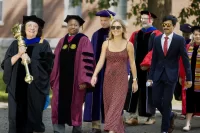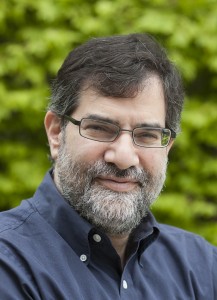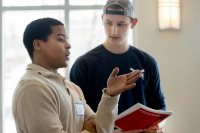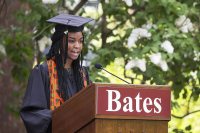
“MOOC” master discusses new teaching approach with Bates faculty

Al Filreis, a Bates parent who holds several teaching positions at the University of Pennsylvania, was this year’s featured speaker for Bates’ annual May Conference on teaching, learning and scholarship. Photo by Marc Glass/Bates College
One day each May, members of the Bates faculty and staff gather for a day to discuss teaching, learning and scholarship. Taking place in Short Term since 2006, the May Conference has grown from a morning-only session to a full day featuring guest speakers, panel presentations, lively discussions and hands-on pedagogy workshops.
This year’s conference focused on “Teaching Transformation(s),” and featured Al Filreis, Kelly Professor of English at the University of Pennsylvania, as its keynote speaker.
The Chronicle of Higher Education has named Filreis one of 2013’s “Ten Tech Innovators” for his belief that massively open online courses (MOOCs) can bring the humanities to the masses.
It’s more than a belief. He seems to have done it.
Last fall, 36,000 students registered for ModPo, Filreis’s online modern poetry class taught through Coursera, an education company that provides the platform for universities to offer online courses for anyone to take, for free. Students of all ages logged in from computers in South Africa, Greece, Pakistan, and Brazil, among many other countries, to create a worldwide community of learners.
Despite the huge numbers and the digital medium, Filreis was determined to make his a course a personal experience. “How else can you teach poetry?” he asked.
ModPo included sessions in which Filreis and his teaching assistants listened to poems, whenever possible from recordings by the poets themselves, and led their far-flung students in “close readings” of the work, digging deeply for meaning by slow, careful analysis of the text, with a focus on literary technique, sound, symbolism, varying ways of interpreting certain figures of speech, and more. The online discussion board was energetic; students read and critiqued one another’s essays; there were weekly call-in sessions as well as live webcasts.
The most active core of students — about 14 percent of those enrolled — got to know one another through these online connections, and a number of them created study groups to take the learning one step further. “A group of nonagenarians in a New Jersey retirement community took the course together,” Filreis said, “and met each week to read and discuss the poems.
“It got out of control in the best possible way.”
In the 10-week course, there were one million views of the posts, and a ModPo Facebook group begun by one of the online students now has more than 3,100 members.
Reading poetry is a personal endeavor, and some students began to share their their stories, as classmates will. Jobs lost, serious illness, hopes and dreams. Some have made major career decisions as a result of ModPo; a number continue to stay in touch with their professor, not unusual in academe.
One profoundly autistic young man literally spoke his first words at the final meeting of the course, reciting his two-word poem, “Not impossible.”
Filreis will teach ModPo online again in the fall.
In addition to being a university professor and tech innovator, Filreis is a Bates parent. He is clear that MOOCs — even one like ModPo — can never replicate the experience his daughter is having at Bates. “She loves it here,” he said.
But he sees a different kind of value to ModPo. “Thousands of people are reading and talking about poetry. It’s outreach,” he says.
Hillory Oakes, director of the Bates Learning Commons as well as director of writing, said, “This year’s May Conference was a great opportunity for Bates faculty to discuss the tremendous pedagogical potential of the digital environment—and to share their thoughts on the MOOCs’ current limitations for replicating the liberal arts experience. Faculty seem intrigued by the possibilities for enhancing the values of a liberal arts education and extending the Bates mission, at the same time that they are adamant that we put neither of those (liberal arts values and the Bates mission) at risk as we move forward.”




